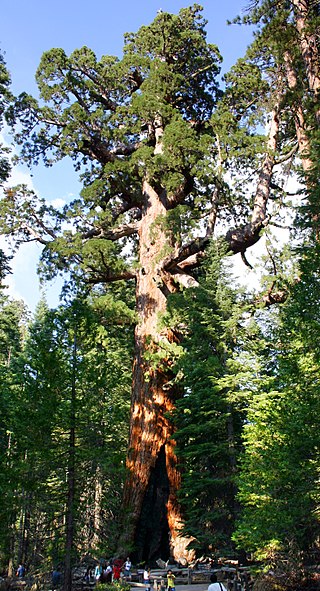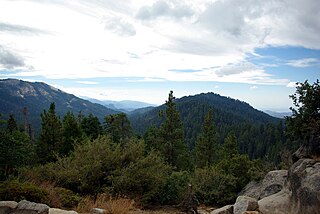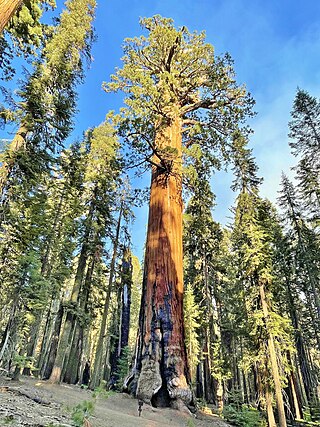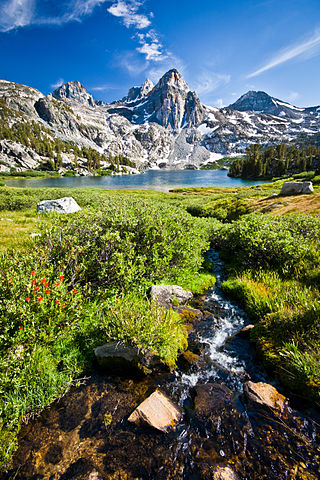
Sequoiadendron giganteum is the sole living species in the genus Sequoiadendron, and one of three species of coniferous trees known as redwoods, classified in the family Cupressaceae in the subfamily Sequoioideae, together with Sequoia sempervirens and Metasequoia glyptostroboides. Giant sequoia specimens are the most massive trees on Earth. The common use of the name sequoia usually refers to Sequoiadendron giganteum, which occurs naturally only in groves on the western slopes of the Sierra Nevada mountain range of California.

Kings Canyon National Park is an American national park in the southern Sierra Nevada, in Fresno and Tulare Counties, California. Originally established in 1890 as General Grant National Park, the park was greatly expanded and renamed to Kings Canyon National Park on March 4, 1940. The park's namesake, Kings Canyon, is a rugged glacier-carved valley more than a mile (1,600 m) deep. Other natural features include multiple 14,000-foot (4,300 m) peaks, high mountain meadows, swift-flowing rivers, and some of the world's largest stands of giant sequoia trees. Kings Canyon is north of and contiguous with Sequoia National Park, and both parks are jointly administered by the National Park Service as the Sequoia and Kings Canyon National Parks.

The General Grant tree is the largest giant sequoia in the General Grant Grove section of Kings Canyon National Park in California and the second largest giant sequoia tree in the world. Once thought to be well over 2,000 years old, recent estimates suggest the General Grant tree is closer to 1,650 years old. The tree also features the third largest footprint of any living giant sequoia, measuring 107.6 ft (32.8 m) in circumference at ground level.

Sequoia National Park is an American national park in the southern Sierra Nevada east of Visalia, California. The park was established on September 25, 1890, and today protects 404,064 acres of forested mountainous terrain. Encompassing a vertical relief of nearly 13,000 feet (4,000 m), the park contains the highest point in the contiguous United States, Mount Whitney, at 14,505 feet (4,421 m) above sea level. The park is south of, and contiguous with, Kings Canyon National Park; both parks are administered by the National Park Service together as the Sequoia and Kings Canyon National Parks. UNESCO designated the areas as Sequoia-Kings Canyon Biosphere Reserve in 1976.

General Grant Grove, a section of the greater Kings Canyon National Park, was established by the U.S. Congress in 1890 and is located in Fresno County, California. The primary attraction of General Grant Grove is the giant sequoia trees that populate the grove. General Grant Grove's most well-known tree is called General Grant, which is 267 ft (81 m) tall and the third-largest known tree in the world. The General Grant tree is over 1,500 years old and is known as the United States' national Christmas tree. General Grant Grove consists of 154 acres (0.62 km2) and is geographically isolated from the rest of Kings Canyon National Park.
The Cave Research Foundation (CRF) is an American private, non-profit group dedicated to the exploration, research, and conservation of caves. The group arose in the early 1950s from the exploration efforts at Floyd Collins Crystal Cave, now within Mammoth Cave National Park. Its stated goals were: to promote exploration and documentation of caves and karst areas, initiate and support cave and karst research, aid in cave conservation and protection, and to assist with the interpretation of caves and karst to the public.
The Generals Highway is a highway that connects State Route 180 and State Route 198 through Sequoia National Park, Sequoia National Forest, Giant Sequoia National Monument, and Kings Canyon National Park in the Sierra Nevada of California. As the road goes through national parks and monuments, the highway is primarily maintained by the federal government instead of a California State Highway controlled by Caltrans.

Redwood Mountain Grove is the largest grove of giant sequoia trees on earth. It is located in Kings Canyon National Park and Giant Sequoia National Monument on the western slope of California's Sierra Nevada. The grove contains the world's tallest giant sequoia. The Hart Tree and Roosevelt Tree grow in the grove and are two of the 25 largest trees by volume in the world. The largest tree is the General Sherman Tree in the Giant Forest grove to the southeast.

The Giant Forest, famed for its giant sequoia trees, is within the United States' Sequoia National Park. This montane forest, situated at over 6,000 ft (1,800 m) above mean sea level in the western Sierra Nevada of California, covers an area of 1,880 acres (7.6 km2). The Giant Forest is the most accessible of all giant sequoia groves, as it has over 40 mi (64 km) of hiking trails.

Boyden Cavern is a show cave located in the Giant Sequoia National Monument of the Sequoia National Forest, along the Kings Canyon Scenic Byway in Fresno County, California. It is just west of Kings Canyon National Park.
The Monarch Wilderness is a federally designated wilderness area located 70 miles east of Fresno, California, in the Sierra Nevada mountain range. It encompasses 44,896 acres (181.69 km2) within both the Sequoia National Forest and the Sierra National Forest and is managed by the United States Forest Service. Elevations range from 950 feet (290 m) to 11,081 ft (3,377 m).

Lincoln is the name of a huge giant sequoia located in Giant Forest in Sequoia National Park. It is currently considered by many to be the fourth largest tree in the world.
Wuksachi Village is a visitor services development in Sequoia National Park, California. It was developed to replace the Giant Forest-Camp Kaweah development, which was regarded as being much too close to sensitive giant sequoia groves. Wuksachi Village is about 5 miles (8.0 km) north of the Giant Forest. It was originally proposed in the 1971 park master plan as the "Clover Creek-Willow Meadow" development, incorporating campgrounds as well as lodgings. Over time the campground feature was dropped. By 1980 the Clover Creek site was approved for development. Work involved a new maintenance facility at Red Fir and improvements to the existing Lodgepole campsite. Work began on Wuksachi Village in 1985 to build employee accommodations, a fire station and water and wastewater treatment facilities. Guest accommodations were built by concessioner Delaware North, opening in June 1999. There are three lodging units with a total of 102 rooms, with potential expansion to 414 rooms. The lodge buildings were designed by Clayton B. Wardel.

The Sequoia and Kings Canyon National Parks is the consolidated management structure for Sequoia National Park and Kings Canyon National Park in California. The two parks have been jointly administered since 1943. They have a combined size of 1,353 square miles (3,500 km2). It was designated the UNESCO Sequoia-Kings Canyon Biosphere Reserve in 1976.

The Pioneer Cabin Tree, also known as The Tunnel Tree, was a giant sequoia in Calaveras Big Trees State Park, California. It was considered one of the U.S.'s most famous trees, and drew thousands of visitors annually. It was estimated to have been more than 1,000 years old, and measured 33 feet (10 m) in diameter; its exact age and height were not known. The tree was topped before 1859. It fell and shattered during a storm on January 8, 2017.
The protected areas of the Sierra Nevada, a major mountain range located in the U.S. states of California and Nevada, are numerous and highly diverse. Like the mountain range itself, these areas span hundreds of miles along the length of the range, and over 14,000 feet of elevation from the lowest foothills to the summit of Mount Whitney.

There are nine national parks located in the state of California managed by the National Park Service. National parks protect significant scenic areas and nature reserves, provide educational programs, community service opportunities, and are an important part of conservation efforts in the United States. There are several other locations inside of California managed by the National Park Service, but carry other designations such as National Monuments. Many of the national parks in California are also part of national forests and National Wildlife Refuges, and contain Native American Heritage Sites and National Monuments.

The Mark Twain Tree was a giant sequoia tree located in the Giant Forest of Kings Canyon National Park. It was named after the American writer and humorist Mark Twain. It had a diameter of 4.8 meters when it was felled in 1891.














